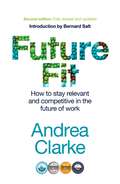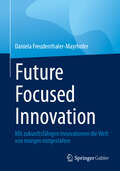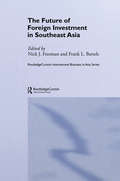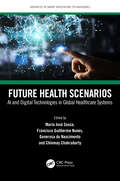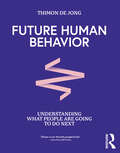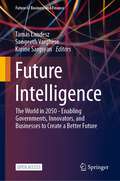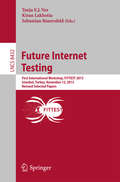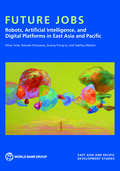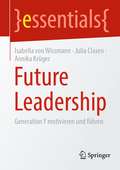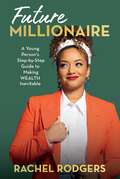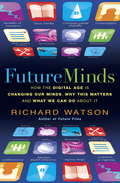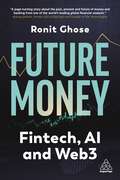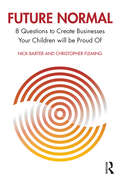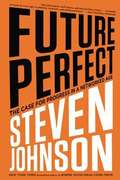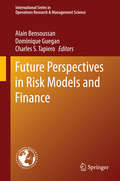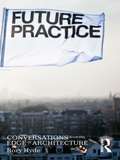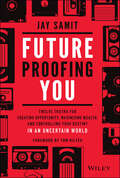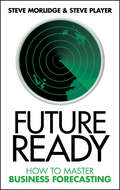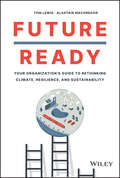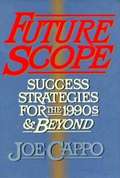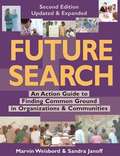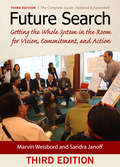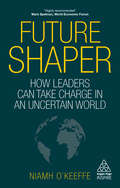- Table View
- List View
Future Fit: How to stay relevant and competitive in the future of work
by Andrea ClarkePrepare for the future with the eight skills needed to become future fit.Winner, Australian Business Book of the Year 2019Finalist, UK Business Book Awards 2020Finalist, Australian Career Book of the Year 2019 The need for skills that defy disruption has never been so urgent, as traditional workplace models give way to confronting new rules of engagement. If you&’re looking for job security, growth and acceleration in a radical new workforce, then Future Fit is the place to start. Award-winning author Andrea Clarke shares her experience, expertise and tactical advice on how to become truly future fit. &‘The future of work is here and it&’s about talent – your talent. It&’s about upgrading our human skills because they&’re landing differently in a hybrid environment,&’ says Clarke. &‘These skills are powerful differentiators in a dynamic and demanding new workplace.&’ Using her experience from a vibrant and varied career, Clarke explores the eight real skills we need for the future: Reputation Capital, Adaptability, Communication, Networking, Creativity, Problem solving, Leadership and Learning. A former Washington, DC, news reporter, Iraqi humanitarian aid worker and EdTech pioneer, Clarke founded FutureFitCo in 2012 – a business that trains emerging leaders to accelerate these core competencies. The Future Fit Digital Program, adapted from this book, is delivered globally to multi-national organisations. &‘Future Fit is a potent toolkit for anyone wanting not only to keep up with the head-spinning pace of workplace change, but to position themselves to excel within it.&’Sydney Morning Herald
Future Focused Innovation: Mit zukunftsfähigen Innovationen die Welt von morgen mitgestalten
by Daniela Freudenthaler-Mayrhofer„Ist unser Unternehmen optimal für zukünftige Entwicklungen aufgestellt?“, „Gelingt es uns, die wesentlichen Transformationen im Umfeld zu erkennen und mitzuprägen?“, „Sind wir fähig, Innovationen für eine noch unbekannte Welt zu entwickeln?“ – diese und ähnliche Fragen beschäftigen Führungskräfte, da sie für die Zukunftsfähigkeit einer Organisation von hoher Relevanz sind.Der Blick in die Zukunft ist ungewiss, herausfordernd und für jedes Unternehmen höchst individuell. Umso offener, positiver und konstruktiver Menschen und Organisationen auf das Morgen blicken, desto größer unsere Handlungsspielräume. Jedes Unternehmen, das den Anspruch stellt, die Zukunft aktiv mitgestalten zu wollen, braucht einen weitblickenden Prozess, der nutzerorientierte Innovationsmodelle um die Entwicklung von Zukunftsbildern erweitert.Das vorliegende Buch bietet einen neuen, zukunftsorientierten Innovationsansatz, der das klassische nutzerorientierte Innovationsmodell fortentwickelt und um die Zukunftsperspektive erweitert. Die Autorin erläutert anschaulich, wie die Auseinandersetzung mit wünschenswerten Zukünften die Innovationsarbeit in Unternehmen wesentlich bereichern kann und stellt ein Modell vor, das bekannte Innovationsprozesse um das Explorieren von Trends, das Formulieren von Visionen und das proaktive Entwickeln von Strategien ergänzt.Ausgewählte Fallbeispiele von Unternehmen zeigen, wie individuell und vielschichtig die Gestaltung der Unternehmenszukunft in der Praxis aussehen kann. Sie dienen damit als Inspiration für den eigenen Umgang in der Innovationsarbeit. Mit Beiträgen von:Barbara BoucekThomas FrauscherMarkus KretschmerChristopher LindingerSandra MagerMartina MaraAndrea MassimianiElisabeth SpitzenbergerPatricia Wiendl-Stark
Future Foreign Investment SEA
by Nick J. Freeman Frank L. BartelsThis book explains the dynamics behind Southeast Asia's foreign investment activity, and looks at the region's options for reviving its reputation as an attractive host for foreign investors. Each chapter focuses on a key element; together, they portray southeast Asia's foreign investment profile and prospects. By bringing these key interlocking elements together under a single cover, the book aims to provide a more profound understanding of the challenges southeast Asian countries face in their on-going attempts both to attract new foreign investment inflows and to continue hosting substantial existing foreign-invested assets.
Future Hackers: The Indispensable Guide for Curious Minds
by Matt O'NeillLooking towards the future can be daunting, but with Future Hackers, the sequel to The Future Is Now, you can prepare for the exciting changes that lie ahead.From technological advancements to cultural shifts, the coming years will bring unprecedented transformations that will shape our lives in ways we can't even imagine.This book is your essential guide to understanding these changes and adapting to them with optimism and confidence. With expert insights into the latest trends in work, leadership and technology, Future Hackers is your indispensable tool for thriving in a rapidly changing world. Whether you're a business leader, a student, or just someone who wants to stay ahead of the curve, this book will help you navigate the road to 2030 and beyond.
Future Health Scenarios: AI and Digital Technologies in Global Healthcare Systems (Advances in Smart Healthcare Technologies)
by Chinmay Chakraborty Maria José Sousa Francisco Guilherme Nunes Generosa Do NascimentoDigital technologies is a major emerging area to invest and research in new models of health management. Future health scenarios are constituted by technologies in health and clinical decision-making systems. This book provides a unique multidisciplinary approach for exploring the potential contribution of AI and digital technologies in enabling global healthcare systems to respond to urgent twenty-first-century challenges. Deep analysis has been made regarding telemedicine using big data, deep learning, robotics, mobile and remote applications. Features: Focuses on prospective scenarios in health to predict possible futures. Addresses the urgent needs of the key population, socio-technical and health themes. Covers health innovative practices as 3D models for surgeries, big data to treat rare diseases, and AI robot for heart treatments. Explores telemedicine using big data, deep learning, robotics, mobile and remote applications. Reviews public health based on predictive analytics and disease trends. This book is aimed at researchers, professionals, and graduate students in computer science, artificial intelligence, decision support, healthcare technology management, biomedical engineering, and robotics.
Future Human Behavior: Understanding What People Are Going To Do Next
by Thimon De JongThe world continues to develop at an astonishing speed – socially and technologically. Human behavior is continually influenced by this ever-changing environment. Is it possible to predict what those new behaviors will be? And what are their implications for our future societies? Thimon de Jong’s Future Human Behavior is a unique and accessible examination of our thrilling, challenging and unpredictable world and how we respond, react and shape it. Using insightful and original examples aligned with pertinent analysis, the author takes the reader on a compelling journey through future behavioral dynamics. He engages with a wide variety of topics, from digitalisation to trust, from ethics to mental health. Future Human Behavior is your inspirational guide to a number of possible futures, and the book you need to be ready for them all.
Future Intelligence: The World in 2050 - Enabling Governments, Innovators, and Businesses to Create a Better Future (Future of Business and Finance)
by Karine Sargsyan Tamás Landesz Sangeeth VargheseThe first quarter of the 21st century introduced the world to rapid uncertainty, be it the social-political and financial crises, or pandemics, or the shaking up of well-established democracies with an increasing rise in populism. At the same time, the technological promise has taken off with automation, artificial intelligence, and nanotechnologies increasingly becoming an economic reality. This open-access book brings together experts of specific domains, through the windows of their experience, and in a crowdsourced fashion, to analyze these world developments to develop an overall view, a compelling case of what we should be prepared for, as we march towards 2050. Topics covered include the future of leadership, the future of solving global challenges, and designing a way of life in harmony with nature. Other topics include disruptive entrepreneurship, the relevance of geographical borders, game-changing future innovations, education, and networked learning, interplanetary travel, and communication. The book also places an importance on the role of empathy, mindfulness, presence, and sharing becoming the anchors for future decision-making by 2050. Of general interest to anyone eager to understand the future of the world, this book is particularly useful for planners, policymakers, strategists and entrepreneurs.
Future Internet Testing: First International Workshop, FITTEST 2013, Istanbul, Turkey, November 12, 2013, Revised Selected Papers (Lecture Notes in Computer Science #8432)
by Tanja E. J. Vos, Kiran Lakhotia and Sebastian BauersfeldThis book constitutes the proceedings of the First International Workshop on future Internet Testing, FITTEST 2013, held in Turkey, Istanbul, in November 2013, in conjunction with the International Conference on Testing Software and Systems (ICTSS).The volume presents a total of 7 contributions; 5 full papers which were selected from 8 submissions, as well as a paper on the Java Unit Test Competition and a summary of the achievements of the FITTEST project.
Future Jobs: Robots, Artificial Intelligence, and Digital Platforms in East Asia and Pacific
by Omar Arias Daisuke Fukuzawa Duong Trung Le MattooPeople in East Asia and Pacific (EAP) countries have prospered over the last few decades because of the growth in productive jobs. Do industrial robots, artificial intelligence (AI), and digital platforms threaten that development model? Future Jobs presents evidence that new technologies have thus far boosted employment. Increases in productivity and scale have outweighed the labor-displacing effects of automation technologies. However, the benefits have been uneven, favoring skilled workers while some less-skilled workers, in more routine and manual jobs, have been pushed into the informal sector. Digital platforms have generated new opportunities for the hitherto marginalized but also created insecurity for incumbent workers. Looking ahead, digitization will enhance the tradability of services, and AI will transform the production processes. EAP countries can benefit by equipping their workforce with the necessary skills and opening their long-protected services sectors to trade and investment. Policy makers, researchers, and businesses will find in this book both insights and questions on how best to harness the potential of new technologies to sustain prosperity in EAP countries.
Future Leadership: Generation Y motivieren und führen (essentials)
by Julia Clasen Isabella von Wissmann Annika KrügerWie wollen Mitglieder der Generation Y geführt werden? Auf Basis wissenschaftlicher Erkenntnisse liefert dieses essential Führungskräften, Beratern und Coaches praktische Handlungsempfehlungen und effektive Methoden für die erfolgreiche Führung von Nachwuchskräften. Anhand von aktuellen Studien werden Bedürfnisse und Erwartungen der Ypsiloner an Führung identifiziert und Erfolgsfaktoren zur Führung dieser Generation abgeleitet. Im Überblick werden drei zentrale Methoden agiler Führung vorgestellt: Scrum, Design Thinking und OKR. Resümierend können Ansätze des agilen Managements zur effektiven Führung von Mitarbeitern der Generation Y als erfolgversprechend bewertet werden.
Future Millionaire: A Young Person’s Step-by-Step Guide to Making WEALTH Inevitable
by Rachel RodgersNo matter how young you are or where you&’re starting from, you are a future millionaire. Declare it. Know it. Demand it. And, with help from bestselling author and self-made millionaire Rachel Rodgers, start working toward it. Future Millionaire is filled with insights on how to develop the right mindset and build smart money habits that will allow you to follow your dreams, build your wealth, and maximize your potential.Rachel Rodgers—author of We Should All Be Millionaires and creator of her own eight-figure business—knows what it&’s like to be broke. She also knows what it&’s like to rise above your circumstances and radically change your future. Now, in her first book for young adults, Rodgers empowers readers 13 and up to do the same.Future Millionaire unpacks all the financial concepts you never learned about in school, like creating a budget, managing debt, investing your savings, and more. Rachel also discusses how to think like a millionaire—creating a healthy money mindset, boundaries, and goals—and act like a millionaire, using your money to support causes that you believe in and upending systems that favor the 1% over marginalized communities.You&’ll also learn how to:Reframe negative, self-sabotaging thoughts so you can pave the way for future successInvest in yourself by practicing self-care, establishing healthy boundaries, and upgrading your everyday lifeCreate a budget, tackle debt, and start investing so you can see your money growUse your money to achieve your dreams and make a difference in the world around you
Future Minds
by Richard WatsonDrawing on the latest research, this book looks at the ways that screen culture is shaping the future and changing the way we think. Future Minds asks: are we becoming addicted to data and how do we go about starting a digital diet, urgently? You'll find thought-provoking and practical suggestions about reclaiming the space and time to think deeply.
Future Money: Fintech, AI and Web3
by Ronit GhoseCryptocurrency. DeFi. Web3. Fintech. The Metaverse. AI. The future of money is here.The world of money is rapidly changing, but what does it all really mean? Exploring key developments such as blockchain, DeFi, AI and the metaverse, the book brings these technical topics to vivid life via narrative deep dives into selected founders and their companies.Spanning multiple geographies from London to Lagos, via Ahmedabad, Dubai, Hong Kong, Karachi and more, Future Money pulls together the story how money is changing in the internet era. Written in jargon-free language, this book clearly provides an understanding of new technologies, showcases the democratization of financial access and presents a vision of the digital future of money, finance and culture.Delivered by one of the world's leading analysts on fintech, web3 and innovations in finance, this is a must-read for anyone interested in understanding the developments, challenges and opportunities of fintech, crypto, web3 and beyond.
Future Normal: 8 Questions to Create Businesses Your Children will be Proud Of
by Christopher Fleming Nick BarterThis is a book for leaders who think about legacy, their own and the one their business is leaving. Yet, none of us get to write our legacy, that is for those who come after us. This book and the lessons within will enable you to improve yours. The eight questions at the core of this book are underpinned by three big ideas: The questions we ask matter. Businesses are the tools we use to shape our world. Business value is optimized for the long term when society thrives. The questions have been developed and road-tested with business leaders and thousands of executives on an MBA that is ranked number one in the world as ‘best for the planet’. Applying them to your business will enable long-term value creation while shifting it to one that your children will be proud of. This book will appeal to business executives, leaders and managers, MBA graduates and students, and all those interested in transforming their organizations for the challenges ahead.
Future Normal: 8 Questions to Create Businesses Your Children will be Proud Of
by Christopher Fleming Nick BarterThis is a book for leaders who think about legacy, their own and the one their business is leaving. Yet, none of us get to write our legacy, that is for those who come after us. This book and the lessons within will enable you to improve yours.The eight questions at the core of this book are underpinned by three big ideas: The questions we ask matter Businesses are the tools we use to shape our world Business value is optimized for the long term when society thrives The questions have been developed and road-tested with business leaders and thousands of executives on an MBA that is ranked number one in the world as ‘best for the planet’. Applying them to your business will enable long-term value creation while shifting it to one that your children will be proud of.This book will appeal to business executives, leaders and managers, MBA graduates and students, and all those interested in transforming their organizations for the challenges ahead.
Future Perfect
by Steven JohnsonCombining the deft social analysis of Where Good Ideas Come From with the optimistic arguments of Everything Bad Is Good for You, New York Times bestselling author and one of the most inspiring visionaries of contemporary culture, Steven Johnson, maps the ways a connected world will be both different and better. Steven Johnson proposes that a new model of political change is on the rise transforming everything from local government to classrooms to health care. It's a compelling new political worldview that breaks with traditional categories of liberal or conservative thinking. Johnson explores this innovative vision through a series of fascinating narratives: from the "Miracle on the Hudson" to the planning of the French railway system; from the battle against malnutrition in Vietnam to a mysterious outbreak of strange smells in downtown Manhattan; from underground music video artists to the invention of the Internet itself. At a time when the conventional wisdom holds that the political system is hopelessly gridlocked with old ideas, Future Perfect makes the timely and uplifting case that progress is still possible.
Future Perspectives in Risk Models and Finance
by Charles S. Tapiero Alain Bensoussan Dominique GueganThis book provides a perspective on a number of approaches to financial modelling and risk management. It examines both theoretical and practical issues. Theoretically, financial risks models are models of a real and a financial "uncertainty", based on both common and private information and economic theories defining the rules that financial markets comply to. Financial models are thus challenged by their definitions and by a changing financial system fueled by globalization, technology growth, complexity, regulation and the many factors that contribute to rendering financial processes to be continuously questioned and re-assessed. The underlying mathematical foundations of financial risks models provide future guidelines for risk modeling. The book's chapters provide selective insights and developments that can contribute to better understand the complexity of financial modelling and its ability to bridge financial theories and their practice. Future Perspectives in Risk Models and Finance begins with an extensive outline by Alain Bensoussan et al. of GLM estimation techniques combined with proofs of fundamental results. Applications to static and dynamic models provide a unified approach to the estimation of nonlinear risk models. A second section is concerned with the definition of risks and their management. In particular, Guegan and Hassani review a number of risk models definition emphasizing the importance of bi-modal distributions for financial regulation. An additional chapter provides a review of stress testing and their implications. Nassim Taleb and Sandis provide an anti-fragility approach based on "skin in the game". To conclude, Raphael Douady discusses the noncyclical CAR (Capital Adequacy Rule) and their effects of aversion of systemic risks. A third section emphasizes analytic financial modelling approaches and techniques. Tapiero and Vallois provide an overview of mathematical systems and their use in financial modeling. These systems span the fundamental Arrow-Debreu framework underlying financial models of complete markets and subsequently, mathematical systems departing from this framework but yet generalizing their approach to dynamic financial models. Explicitly, models based on fractional calculus, on persistence (short memory) and on entropy-based non-extensiveness. Applications of these models are used to define a modeling approach to incomplete financial models and their potential use as a "measure of incompleteness" Subsequently Bianchi and Pianese provide an extensive overview of multi-fractional models and their important applications to Asset price modeling. Finally, Tapiero and Jinquyi consider the binomial pricing model by discussing the effects of memory on the pricing of asset prices.
Future Practice: Conversations from the Edge of Architecture
by Rory HydeDesigners around the world are carving out opportunities for new kinds of engagement, new kinds of collaboration, new kinds of design outcomes, and new kinds of practice; overturning the inherited assumptions of the design professions. Seventeen conversations with practitioners from the fields of architecture, policy, activism, design, education, research, history, community engagement and more, each representing an emergent role for designers to occupy. Whether the "civic entrepreneur," the "double agent," or the "strategic designer," this book offers a diverse spectrum of approaches to design, each offering a potential future for architectural practice. With a foreword by Dan Hill and interviews with Steve Ashton, ARM; Bryan Boyer, Helsinki Design Lab; Camila Bustamante; Mel Dodd, muf_aus; DUS Architects; Jeanne Gang, Studio Gang; Reinier de Graaf and Laura Baird, AMO; Conrad Hamann; Natalie Jeremijenko, xClinic; Indy Johar, 00:/;Bruce Mau; Arjen Oosterman and Lilet Breddels, Volume; Todd Reisz; Wouter Vanstiphout, Crimson; Matt Webb, BERG; Marcus Westbury, Renew Newcastle; and Liam Young, Unknown Fields
Future Proofing You: Twelve Truths for Creating Opportunity, Maximizing Wealth, and Controlling your Destiny in an Uncertain World
by Jay SamitWith the right mindset and insight, anyone can become a millionaire. Are you tired of just paying bills until you die? Are you wasting your life at a job that doesn’t make you fulfilled or financially secure? Then Future Proofing You: Twelve Truths for Creating Opportunity, Maximizing Wealth, and Controlling Your Destiny in an Uncertain World is for you. In this life-changing book, celebrated author and entrepreneur Jay Samit, who’s worked with such visionaries as Bill Gates, Steve Jobs, Reid Hoffman, and hundreds of successful entrepreneurs, shares the key understandings and step-by-step process for becoming rich and never needing another job again. To prove the power of his 12 Truths, Samit also details the journey of how he mentored a broke millennial with these principles and empowered him to go from being on welfare to becoming a self-made millionaire in one year. Building upon the principles in his internationally acclaimed book Disrupt You, Samit explains: How to identify an idea and market to start your business How to build a virtual company with little or no capital The latest free software tools for managing your business Ways to get a piece of a trillion-dollar opportunity bigger than mobile How to harness the three primary fears of others to generate more sales Strategies for finding the right mentors to accelerate your success Techniques to structure any deal for creating recurring revenue and lasting wealth This book is perfect for anyone who is tired of jobs with no security, hopes to truly realize their professional and personal potential, and is looking for a way to build a better life for them and their family. Future Proofing You 
Future Ready
by Steve Morlidge Steve PlayerThe recent crisis in the financial markets has exposed serious flaws in management methods. The failure to anticipate and deal with the consequences of the unfolding collapse has starkly illustrated what many leaders and managers in business have known for years; in most organizations, the process of forecasting is badly broken. For that reason, forecasting business performance tops the list of concerns for CFO's across the globe. It is time to rethink the way businesses organize and run forecasting processes and how they use the insights that they provide to navigate through these turbulent times. This book synthesizes and structures findings from a range of disciplines and over 60 years of the authors combined practical experience. This is presented in the form of a set of simple strategies that any organization can use to master the process of forecasting. The key message of this book is that while no mortal can predict the future, you can take the steps to be ready for it. 'Good enough' forecasts, wise preparation and the capability to take timely action, will help your organization to create its own future. Written in an engaging and thought provoking style, Future Ready leads the reader to answers to questions such as: What makes a good forecast? What period should a forecast cover? How frequently should it be updated? What information should it contain? What is the best way to produce a forecast? How can you avoid gaming and other forms of data manipulation? How should a forecast be used? How do you ensure that your forecast is reliable? How accurate does it need to be? How should you deal with risk and uncertainty What is the best way to organize a forecast process? Do you need multiple forecasts? What changes should be made to other performance management processes to facilitate good forecasting? Future Ready is an invaluable guide for practicing managers and a source of insight and inspiration to leaders looking for better ways of doing things and to students of the science and craft of management. Praise for Future Ready "Will make a difference to the way you think about forecasting going forward" -Howard Green, Group Controller Unilever PLC "Great analogies and stories are combined with rock solid theory in a language that even the most reading-averse manager will love from page one" -Bjarte Bogsnes, Vice President Performance Management Development at StatoilHydro "A timely addition to the growing research on management planning and performance measurement. " -Dr. Charles T. Horngren, Edmund G. Littlefield Professor of Accounting Emeritus Stanford University and author of many standard texts including Cost Accounting: A Managerial Emphasis, Introduction to Management Accounting, and Financial Accounting "In the area of Forecasting, it is the best book in the market. " -Fritz Roemer. Leader of Enterprise Performance Executive Advisory Program, the Hackett Group
Future Ready: Your Organization's Guide to Rethinking Climate, Resilience, and Sustainability
by Tom Lewis Alastair MacGregorRethink climate, resilience, and sustainability for your organization In Future Ready: Your Organization’s Guide to Rethinking Climate, Resilience, and Sustainability, a team of business leaders with deep expertise in engineering, planning, finance, project, program implementation and advisory consulting perspective delivers an essential guide for executives, managers, and other business and infrastructure organization leaders to set and implement a resilience, sustainability and ESG strategy in complex project and operating environments. Through practical examples and proven insights, readers will learn to proactively engage with stakeholders, successfully plan, implement, and measure the impacts of their initiatives, and effectively communicate the results. In the book, the authors draw on hundreds of completed projects across a full range of client organizations, markets, sectors, and scales to equip readers with unprecedented insights and the behind-the-scenes work that went into making the projects successful. The authors also include: Strategies for identifying, cataloguing, and reporting risks—from the operational to the physical and transactional—as well as explanations of how climate risk scenarios can reveal hidden opportunities and unexpected vulnerabilities A Future Ready mindset and the specific examples of organizational sustainability and climate adaptation commitments and the paths companies have taken to meet their goals Critical questions that leaders must ask of themselves and their organizations before they begin a climate, resilience, and/or sustainability initiativeA must-read guide for executives, board members, ESG professionals, and other business and infrastructure organization leaders, Future Ready belongs in the hands of anyone who finds themselves responsible for helping an organization achieve their environmental, social, and governance goals.
Future Scope: Success Strategies for the 1990s and Beyond
by Joe CappoAn insightful look at the challenges and opportunities as American businesses and individuals approach the 21st century.
Future Search: An Action Guide to Finding Common Ground in Organizations & Communities
by Marvin Weisbord Sandra JanoffWhen the term ''future search'' appeared in Productive Workplaces (Weisbord, 1987), so many people sparked to it that we decided, after trying fancier names like ''strategic futures conference,'' to retain it. The response to the concept led to Discovering Common Ground (Weisbord et al, 1992), a work that pulled together principles and practices for value-based action planning. The earlier book presented a variety of high participation models and cases, most based on the Emery/Trist Search Conference, including early experiments with future search. In this book we focus on our evolving future search model. Here we go deeply into our sources and rationale, our experiments with tasks and techniques, and examples of how we and many colleagues have employed this model and its variations. We also provide a philosophical rationale for our design and facilitation practices. -amazon.com
Future Search: Getting the Whole System in the Room for Vision, Commitment, and Action
by Marvin Weisbord Sandra JanoffNEW EDITION, REVISED AND UPDATED Future Search is among the best-established and most effective methods for enabling people to make and implement ambitious plans. It has been used to redesign IKEA’s product pipeline in Sweden, develop an integrated economic development plan in Northern Ireland, and demobilize child soldiers in Southern Sudan. Written by the originators, this book is the most up-to-date account of this powerful change method. This third edition is completely revised, reorganized, and updated with nine new chapters. It contains new cases and examples, advice on combining Future Search with other methods, and a summary of formal research studies. The chapters on facilitating diversity provide a theory, philosophy, and method for working with any task group. Marvin Weisbord and Sandra Janoff offer specific guidance for Future Search sponsors, steering committees, participants, and facilitators and new ideas for sustaining action after the Future Search ends. They’ve added striking evidence of Future Search’s efficacy over time, examples of its economic benefits, guidelines for making Future Searches green, and much more. They include a wealth of resources—handouts, sample client workbooks, follow-up methods, and other practical tools. If you want to do strategic planning, product innovation, quality improvement, organi-zational restructuring, mergers, or any other major change requiring stakeholder en-gagement, this book is your guide.
Future Shaper: How Leaders Can Take Charge in an Uncertain World (Kogan Page Inspire)
by Niamh O'KeeffeWe live in a world of continuous uncertainty and on the brink of a massive digital and AI-powered shift. What should leaders do? The answer is not to shy away from inevitable changes and more uncertainty, but to have the courage to face it. Leaders need to take charge by embracing new technologies and ideas and converting these into opportunities for leadership innovation. The best ways for leaders to predict the future is to help create the future.Future Shaper is about giving back a sense of control. It's about empowering leaders to take charge and shape the future. Niamh O'Keeffe asks leaders to re-calibrate their leadership skills to include imagination and courage, to embrace innovation and drive growth and create a better future. Future Shaper helps readers to: · Embrace new digital technologies, understand AI and equip themselves for those not-yet-invented challenges · Gain insights from today's successful leaders · Make an impact and feel more in control using an easy-to-understand leadership framework
